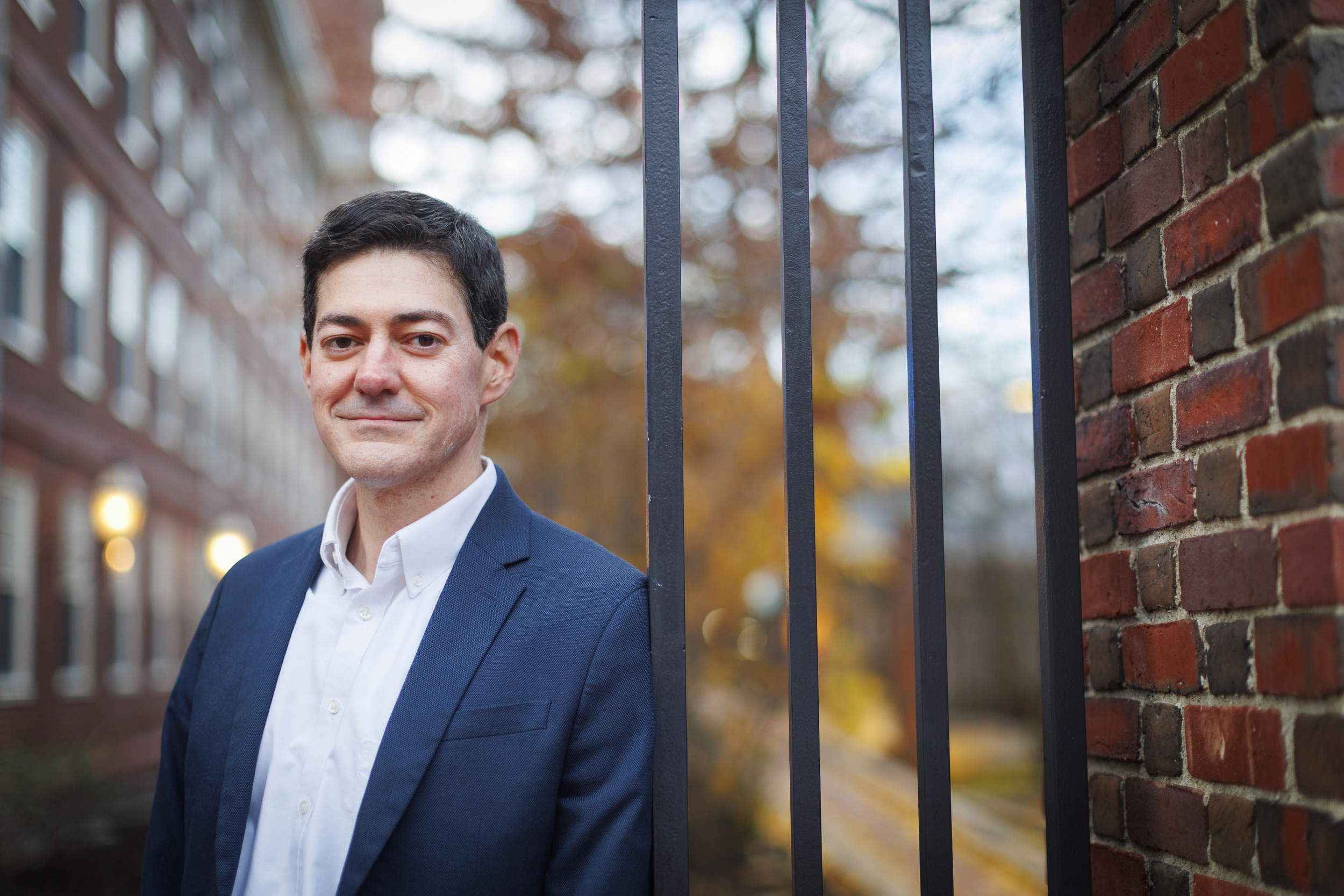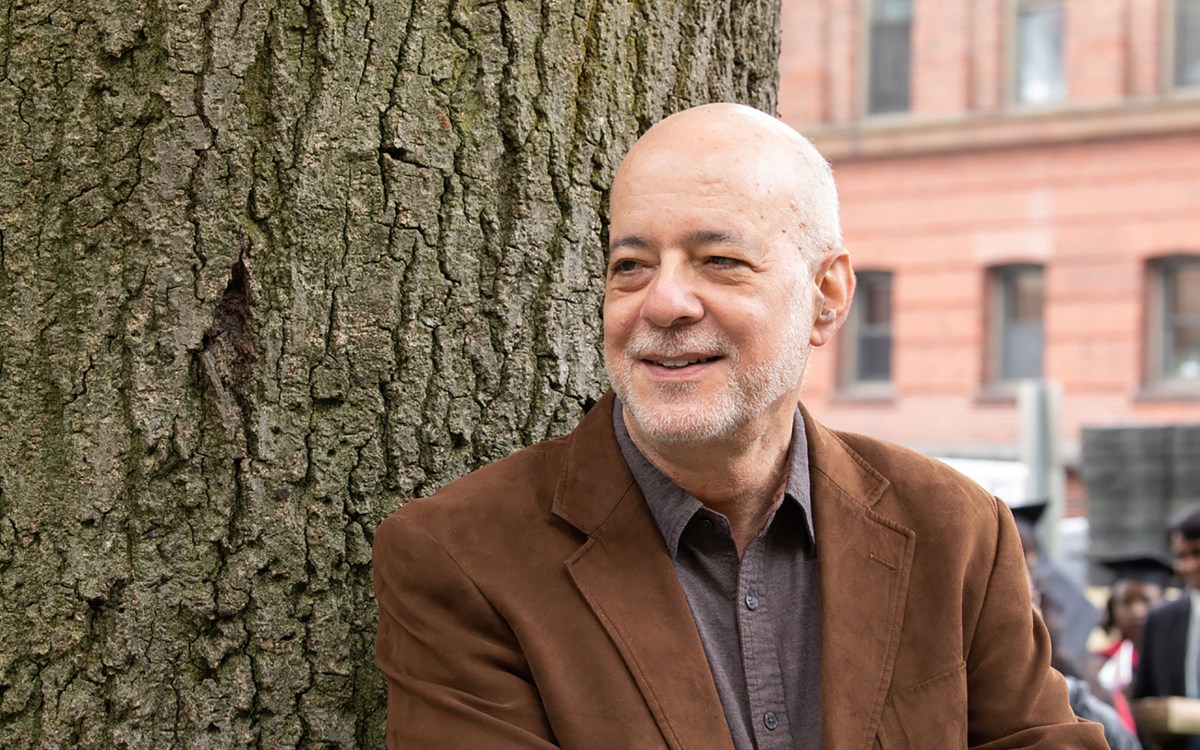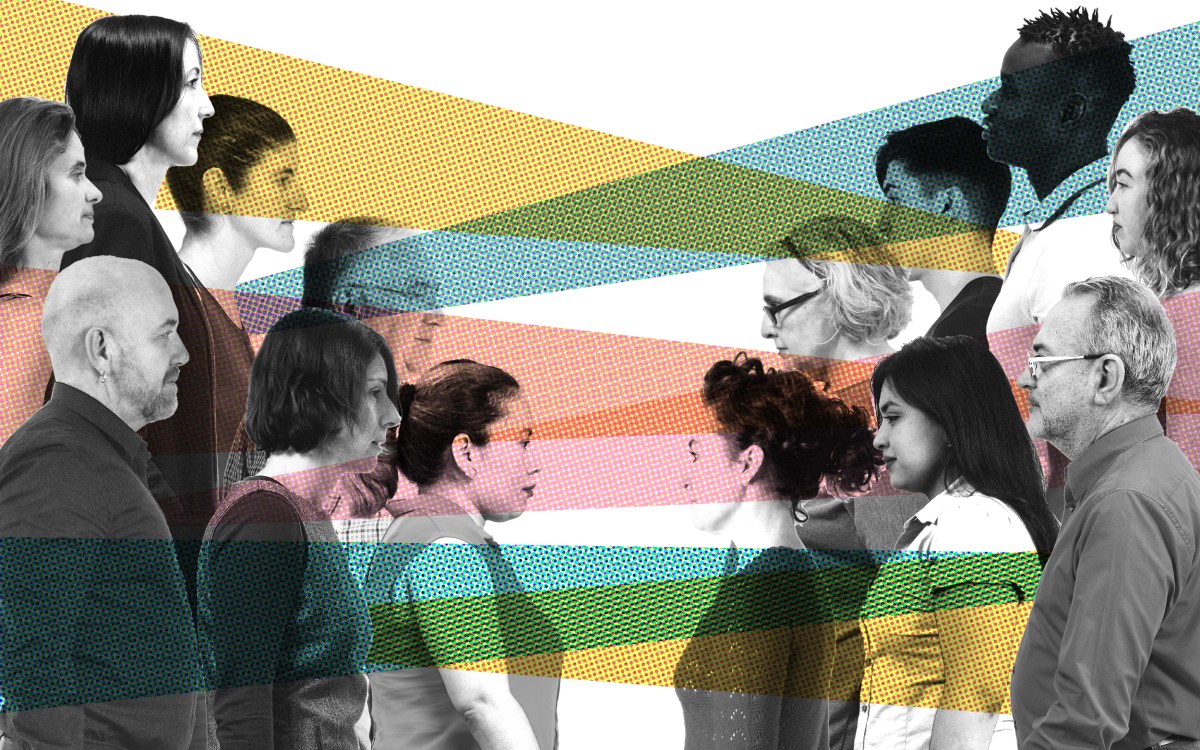
Stephanie Mitchell/Harvard Staff Photographer
How to engage in cool-headed debates on hot topics
Eric Beerbohm named senior adviser for civil discourse, planning initiatives, training for students
Eric Beerbohm, a professor of government and faculty director of the Edmond & Lily Safra Center for Ethics, has been named senior adviser for civil discourse, Hopi Hoekstra, the Edgerley Family Dean of the Faculty of Arts and Sciences, announced Tuesday.
In the new role, Beerbohm will launch a series of initiatives designed to advance constructive dialogue in classrooms and seminar halls across the FAS.
“Harvard brings together diverse perspectives, and, when shared in a respectful way with openness and curiosity, not only enhances learning, but creates an intellectually inclusive environment that fosters critical thinking, empathy, and understanding. Supporting that intellectual dynamism requires that we have access to a shared set of skills in civil discourse,” Hoekstra said.
“Strengthening those skills is an essential investment in our institutional effectiveness and key to preparing our students to engage meaningfully with the world’s complex challenges. Eric’s deep scholarly expertise, engagement with our students, and collaborative approach make him the ideal person to lead this effort. I couldn’t be more excited to work with him and the Center for Ethics on what, for me, is a long-term priority for our School.”
Beerbohm, who is also a faculty dean at Quincy House and an affiliate in the Department of Philosophy, said one overarching strategy is to create avenues where students can practice civil disagreement and debate. He shared a few of his specific plans and ideas in a recent call with the Gazette. The interview was edited for length and clarity.
Q&A
Eric Beerbohm
GAZETTE: What are your top priorities?
BEERBOHM: There’s already important work underway at Harvard in modeling civil discourse and structuring difficult conversations, but I’ll begin by surveying the landscape to gain a better understanding of what needs exist. Harvard College has been leading efforts for the past several years to convene students and faculty in discussions on the topic of intellectual vitality.
I also hope we can draw upon the Edmond & Lily Safra Center for Ethics’ extensive work on the theory and practice of civil discourse to support civility in curricular and co-curricular spaces across Harvard. Our Design Studio for Ethics and Civic Pedagogy is building a library of workshops, exercises, and simulations that aim to foster civility in discussions and debates.
The hope is to use these tools, as well as others, to create environments where students feel empowered to share their thoughts and opinions without fear of ridicule or hostility, which leads to richer discussions and exposure to diverse perspectives.
GAZETTE: Any other lessons from your long affiliation with the Center for Ethics that you plan to apply?
BEERBOHM: I’ll start with the Undergraduate Ethics Fellowship program, which was launched 10 years ago and convenes students hailing from very diverse perspectives to grapple with the values at the heart of their senior theses. I was fortunate enough to serve as the program’s founding director.
That very first year we met and discussed during the late-night philosophical hours of 9 to 11 p.m. with a ton of pizza. I was amazed by the energy the undergrads brought — and continue to bring to this day. They taught us that if we build spaces where students can have their core values engaged but also challenged in good faith, they will come.
Civil discourse has played a deep role in the Center’s history. Our founding director, Dennis F. Thompson, did pioneering work on civility, including his classic paper with Amy Gutmann, “Moral Conflict and Political Consensus” (1990).
Our previous director, [James Bryant Conant University Professor] Danielle Allen, made initiatives around civil discourse a priority during her tenure, and her work leading the Presidential Taskforce on Inclusion and Belonging identified the need to bring together principles of diversity, equity, and inclusion and academic freedom, which the task force viewed as mutually supportive.
Over the past few years, the Center has also run a civil disagreement public lecture series. We hosted moderated conversations among four panelists — notice, not two — coming from different points of view on a single issue, from immigration to abortion, to model healthy dialogue across difference. This effort allowed us to explore topics in an intellectual, honest way, a deep way, and a sensitive manner.
“In a polarized society like ours, campuses are essential places to train and practice civility.”
GAZETTE: I understand you’ll be launching another lecture series. What can you share about it?
BEERBOHM: The new series will be modeled on the Intercollegiate Civil Disagreement Partnership Program, an initiative with several other colleges and community colleges that is open to Harvard undergraduates.
That program has three goals that will guide us in this new series, which will be less a lecture series and more of a discussion/dialogue series. The first is, to advance fundamental democratic commitments to freedom of expression, equality, and agency. Second, to develop students’ skills to facilitate conversations across political difference. And third, to create spaces for civil disagreement to flourish on college campuses.
We’re imagining a series where participants, including faculty from across the FAS, will model civil discussion without being pigeonholed into simple binaries on issues of weighty moral and political significance.
GAZETTE: Can you talk about any other ideas in the works?
BEERBOHM: This September, as part of the multiyear Intellectual Vitality Initiative, the Center for Ethics and Harvard College have created the Fellowship in Values Engagement (FiVe), which aims to promote ethical reflection and a culture of civil disagreement in undergraduate House life.
Our inaugural class of fellows was admitted in early October and includes house tutors and yard proctors who’ve been convening to design innovative programming to support our undergraduate students as they grapple with core values and engage in honest and meaningful ways.
We hope to learn important lessons from this pilot. We hope to expand the program and scale it into other parts of student life, including student groups — in particular, leaders of student organizations — and to meet the needs of our graduate students, whose research is often undergirded by strongly held values about equality and human dignity.
GAZETTE: What impact will students see in the classroom?
More like this
BEERBOHM: Our aim is to expand our longstanding partnership with the Program in General Education, and to cultivate new opportunities with the Expository Writing program to anchor civil discourse as a core value in undergraduate courses.
This spring semester, our Ethics Pedagogy Fellows — these are graduate students and postdocs with expertise in political and moral theory — will assist in building civil discourse into syllabi. We will also be offering workshops for teaching fellows and faculty involved in Gen Ed courses.
For one potential model, consider Harvard’s Embedded EthiCS program. They create tailored ethics modules to the specific content of Computer Science courses. These modules are primarily taught by philosophers who are embedded in CS classes to provide analytic rigor and ethical reflection.
We’re exploring how this model can be extended and scaled across the FAS, where we would co-create modules in civil discourse with faculty and grad students and embed these models into the courses across the curriculum.
GAZETTE: What will success look like?
BEERBOHM: In a polarized society like ours, campuses are essential places to train and practice civility. At least one success condition for us is seeing students engage in ethically charged topics with those who may have deeply felt opposing views while genuinely listening to sincere expressions of others’ values.
Civility should never be seen as cold or chilly. It’s natural in these settings to passionately advocate for our positions. The inevitable disagreements can and will be uncomfortable. When we put civil discourse into practice, it will almost certainly be imperfect. But it is a necessity for democratic life.








